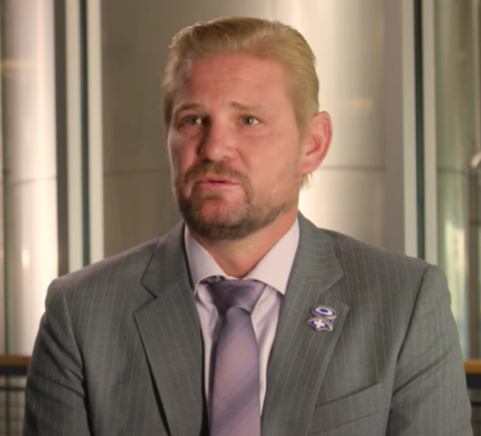Veteran Jonathan Warren was very skeptical when he went to his first transcranial magnetic stimulation session. Then he got the best night of sleep he'd had in a decade. As his sessions continued his improved sleep continued and his heavy use of alcohol and marijuana reduced.
Learn more about some of the treatments available for those recovering from brain injury and PTSD using our Treatment Hub.
Watch more videos from Jonathan Warren.
So I remember sitting down and the treatment is a wand that they put over your head and you kind of feel like a tapping noise and you hear a sound. And I remember feeling it tap my head and I looked at the guy and I said you got to be crazy. You think this is really going to help me, you’re out of your mind. And sure enough that night, I went home and I actually slept for ten hours straight. And I hadn’t done that in about ten years. So I dismissed it because I was very skeptical about this treatment. I had been through so many different ones and I thought well this is probably just another one that’s not going to work but I'm going to try it. So I came in the next day and they asked well how did you sleep last night? And I said I slept really good, but it had nothing to do with you. You get no credit. And it wasn’t for about two weeks, maybe closer to three weeks until I finally noticed something. And at this point in my life I was drinking to black out six, seven days a week. Smoking pot from the time I woke up to go to sleep. I was taking about 10 milligrams of Benzodiazepine, it’s like Xanax. I was just a zombie for a large part of it. So I sat down with a buddy after about three weeks of this treatment and went to have a cocktail, we had one, he was going to pour another one and I just said I'm good right now, which surprised me. And what I felt was that I wasn’t trying to escape my anxiety, I wasn’t trying to drink to feel comfortable with my friend, I just felt connection, I felt what I’d been lacking for so long. So what a lot of us go through I think who deal with PTSD and TBIs, you might hear people say well, I feel really alone in all of this. But what I’ve experienced is when you have so much inter turmoil happening and the anxiety is so bad it’s very difficult to feel connected to somebody, you might know that you love them and they love you, but you can’t really feel it. So to actually get that back and to be able to feel that was a game changer. So I went back to the Brain Treatment Center and said what is going on. We took a picture of my brain, had another look and all that tissue that was sleeping was mostly awake. So it was really neat to actually see a physiological objective measure that you could follow over time. And it’s not just in your head or a placebo, I think I’m getting better. No, you can actually see it happening. So for me it was a life changing event. And it allowed me to really incorporate the other therapies that I’d been through. So cognitive behavior therapies, all the different ones and even the prolonged exposure stuff that I went through. I could now implement into my daily life effortlessly instead of really sitting down and trying to grind and focus on these different principles. So it’s for me the missing link where a lot of times we just have the psychology part of it or the chemistry. We also need the physiological aspect as well. This video was produced by BrainLine thanks to generous support from the Infinite Hero Foundation.
This video was produced by BrainLine thanks to generous support from the Infinite Hero Foundation.
About the author: Jonathan Warren
Jonathan Warren is a veteran and Military Director of The Brain Injury Center in Newport Beach, CA.

